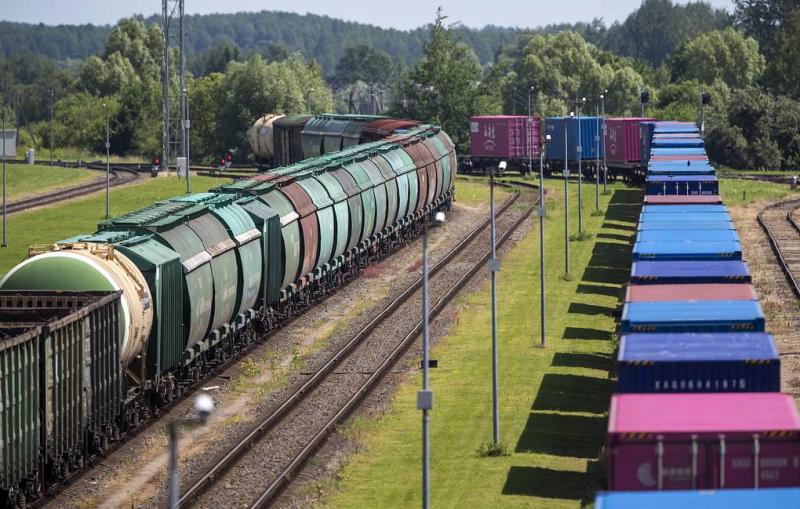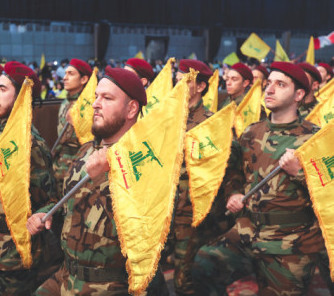
© AP Photo/Mindaugas Kulbis
Top stories from the Russian press on Thursday, June 23rd, prepared by TASS
Vedomosti: How Russia could retaliate for Lithuania’s transit ban
Russian officials are discussing measures to retaliate for Lithuania’s ban on the transit of certain goods through its territory over the EU sanctions, Kremlin Spokesman Dmitry Peskov announced on Wednesday. The day before, Russian Security Council Secretary Nikolay Patrushev warned that Moscow’s response would sting the Baltic nation’s population.
Russia could retaliate with economic, political or military measures, Alexander Nosovich, a political analyst at the Valdai think-tank, told Vedomosti. Symmetrical restrictions for Lithuania’s transit are likely to be the key. If Russia chooses to ban transit via Kaliningrad, Lithuania’s economy will be affected. Or Russia could opt for a proportionate scenario mirroring half of the goods banned by Lithuania. These would primarily include fertilizers as well as oil products from the majority of EU countries. Though Lithuania has formally stopped importing Russian oil products, one of its refineries, which is also the country’s largest taxpayer, has been processing oil brought from Poland via the Kaliningrad Region, Nosovich said. So, a ban on oil transit from Poland would hit Lithuania’s budget hard, the expert added.
Russia could also sue Lithuania in a Stockholm court, said Vladimir Olenchenko, a senior researcher at the Institute of World Economy and International Relations (IMEMO). According to the expert, Moscow has already complained that Vilnius’ move runs counter to the 2002 agreements on the transit of goods to the EU, and could demand compensation for the costs of using a longer transit route via St. Petersburg, Ust-Luga and other northwestern ports.
It's clear that Russia’s trade with the EU will plunge even further, and a seventh package of sanctions will inevitably impose tougher restrictions, said Mikhail Burmistrov, CEO of Infoline Analytics. Therefore, Russia should use the situation to adjust to new EU restrictions, rather than put pressure on Lithuania.
Nezavisimaya Gazeta: Ukraine should not expect any privileges towards its accession to EU
At a two-day summit, to kick off in Brussels on Thursday, European Union leaders will discuss enhancing European security and stability, the conflict in Ukraine and granting EU candidacy to Ukraine and Moldova, President of the European Council Charles Michel has announced. The heads of state and government will also consider a seventh package of sanctions against Russia, but no decision is expected, Nezavisimaya Gazeta writes.
EU leaders are anticipated to unanimously sign off on the European Commission’s recommendation to grant Ukraine candidate country status on Thursday evening, according to the draft communique seen by Euractiv.
A European diplomat told Nezavisimaya Gazeta on condition of anonymity that Ukraine should not expect any privileges towards accession to the bloc though. "The process usually takes years, and no result can be guaranteed. Everything will depend on the pace at which the country’s national legislature will align with EU standards, or the so-called Acquis Communautaire," the diplomat said. According to him, Ukraine will have to comply with the EU’s rules in a range of spheres - from the judicial system to detailed norms governing labor laws.
Meanwhile, a US diplomat told the paper that Washington had been actively communicating with its G7 partners about toughening anti-Russian sanctions. At a summit to open in Germany on June 26, G7 leaders are planning to discuss ways to intensify diplomatic and economic pressure on Moscow. These may include an expanded list of individuals under visa restrictions, stricter export control measures on deals with Russia and the seizure of frozen Russian assets to help restore Ukraine. To achieve the latter goal, G7 states will have to remove a number of legal obstacles, and they have already started working on it, the source stressed.
Nezavisimaya Gazeta: Lavrov to discuss oil in Iran
Russian Foreign Minister Sergey Lavrov is holding a two-day Iran tour. He is visiting amid a brand-new reality facing the two countries that can either benefit or hamper deepening cooperation. On the one hand, both being under international sanctions, Russia and Iran could get on a path towards political and economic reproachment. On the other hand, unlike Russia, Tehran could soon expect the restrictions lifted on it without having to reform its foreign or domestic policy. For this, efforts should be made to unlock the stalemate on the Joint Comprehensive Plan of Action, or the so-called Iran nuclear deal, Nezavisimaya Gazeta reports.
Earlier this month, Russia’s envoy to the Iran nuclear talks in Vienna, Mikhail Ulyanov, said the concluding document is 99% ready, but things changed radically after an IAEA Board of Governors meeting in early June when a resolution virtually condemning Iran was adopted. And on June 15, Politico reported that the Biden team had told Congress at a briefing behind closed doors that the United States could even up the sanctions against Iran.
Both the US and the Islamic Republic have objective reasons to restore the nuclear deal, Senior Fellow at the Russian Academy of Sciences’ Institute of Oriental Studies Vladimir Sazhin told the paper. With it, US President Joe Biden could keep his campaign promises, and it is also vital for the US and Europe to get Iranian oil back to the market now that a Russian oil embargo has been imposed. "Iran could put as much oil on the market as OPEC allows. This would help reduce soaring gasoline prices in the US which is very important for Biden ahead of midterm elections to be held in November," Sazhin noted. And Iran needs the sanctions eased, since its economy is in a deplorable state.
Meanwhile, lifting the sanctions on Iran that could bring oil prices down would not be beneficial for Russia now, and the country is not interested in having Iran possess nuclear weapons, too. "Russia cannot openly oppose restoring the nuclear deal, so Lavrov is visiting Tehran to settle this issue diplomatically," Sazhin speculated.
Izvestia: Situation in Afghanistan no reason for complacency, Russia’s envoy to Tajikistan says
This year marks the 30th anniversary of diplomatic relations between Russia and Tajikistan. Over that period, the two countries have seen a large number of important events between both of them, and a solid foundation has been created for enhanced cooperation, Russian Ambassador to Tajikistan Igor Lyakin-Frolov told Izvestia in an interview. Tajikistan has been Russia’s strategic partner and ally since the first days of its independence, and bilateral relations have been on the rise, with ties being actively developed in all spheres, the envoy emphasized.
Also, there is a positive trend in bilateral economic relations. In 2021, trade between the two countries hit a record exceeding $1.3 billion, and direct investments amounted to $1.7 billion, he said.
Political dialogue has been developing dynamically, at the highest level, too, Lyakin-Frolov said. Tajikistan’s armed forces are being equipped with state-of-the-art weapons, while its military are being trained at educational institutions affiliated with the Russian Defense Ministry and at Russia’s 201st military base, he added.
The situation along Tajikistan’s southern border has been complicated, though, the Russian diplomat pointed out. He cited some data, according to which, about 6,000 militants from various terrorist organizations are active in northern Afghanistan.
Rossiyskaya Gazeta: Russia to pay its foreign debt in rubles
From now on, Russia will pay for its Eurobonds in rubles. The temporary procedure has been introduced in a decree signed by President Vladimir Putin. The amount of payment will be determined by the Finance Ministry, and no approval or guarantees from foreign depositaries will be needed, Rossiyskaya Gazeta reports.
The new arrangement of payments is being introduced amid Western sanctions, and it was announced earlier in June by Finance Minister Anton Siluanov. He recently explained that unsanctioned banks, or those creditors who are still authorized for transactions with foreign exchange, would likely be involved in the currency conversion processes. The government has ten days to draw up a list of such banks, while the Finance Ministry and the Bank of Russia will determine the entitled holders of Eurobonds.
Siluanov has claimed that Russia has enough money to pay its debt. While the United States has been searching for ways to declare Russia in technical default, it will have nothing to do with a real default, like the one in 1998, and it is foreign holders of Russian securities who will be affected, not the Russian economy or the country’s population, the finance minister concluded.









